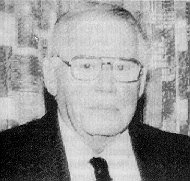Samuel Rittenberg
An Enduring Legend

There are always exceptions. Samuel Rittenberg is that special exception. He has lived in the South for much of his life even while moving around during his formative years. And he is still alive at the young age of 97, born in the year 1901. His 98th birthday will come up in May, just a few months away.
Samuel’s saga is an interesting one and is an example of perseverance, stick-to-it work ethic and personal principles. In his own quiet way, many years before the ADA became reality, Samuel was a pioneer when it came to advocating the rights and needs of the deaf as first class citizens. This is a trait that not too many of Samuel’s Fiends and admirers are fully aware of.
He was the standard that friends and admirers endeavored to live up to. Now let’s track his beginnings.
Samuel was born in Hungary and when he was one years old his Jewish family emigrated to the USA. That was in the year 1902. Seven years later he became an American citizen.
He may have possibly been born deaf, but no one really knows. He was six years old in a public school in Nashville, TN when a teacher suspected his hearing loss and had his hearing tested. His deafness was confirmed by a doctor.
Sent to Tennessee School for the Deaf, the principal put him in the oral department. The school had a separate manual department but apparently the principal felt Samuel was too good for it – still lip-reading was a skill that Samuel never mastered despite his oral school training!
He entered Gallaudet University in 1918, and stayed there three years before dropping out. Determined to make something out of his life, he decided on primary and a secondary goals. The primary one was to become a dentist and the secondary, or better put – back up plan to was to become a printer. Samuel then entered Vanderbilt University but only stayed there few months. Remember in these days interpreters were unheard of. Anyway he became a printer and started work at the printing shop at Catholic University in Washington, DC.
The printing shop was where his resolve to be a good Jew was tested. One of the employees, knowing Samuel was Jewish, offered him ham sandwiches. Samuel put the sandwiches aside without eating them, aware that he was being watched. When the employee asked why the sandwiches weren’t eaten, Samuel replied “I will eat the sandwiches at your wedding,” a comment that made everyone laugh.
He moved around a lot before settling down for good in Birmingham, AL in 1942. It was at Birmingham when Samuel made his mark. A home full of awards and honors hanging on the walls attests to his extensive range of community and civic activities.
Samuel contributed articles for the Silent Worker, the Deaf American, the Birmingham News Sunday editions and served as the editor for twenty three years with the Alabama Association of the Deaf newsletter.
Speaking of discrimination, Samuel fought the state of Alabama when the legislators wanted to prohibit the deaf from driving cars. He marshaled the resources of the newspaper editors, state association of sheriffs, and various educators to shoot down the motion filed by the legislators. Samuel considers it to be one of the proudest actions he has ever did.
Samuel was also active with the National Fraternal Society of the deaf, the NAD, the deaf bowlers’ groups, the AAAD and the Southeast Athletic Association of the Deaf. He has been inducted into several hall of fames.
Said one leader “l have not always agreed with Ritty, but I have never doubted his intentions. He cares very much about the deaf.”




